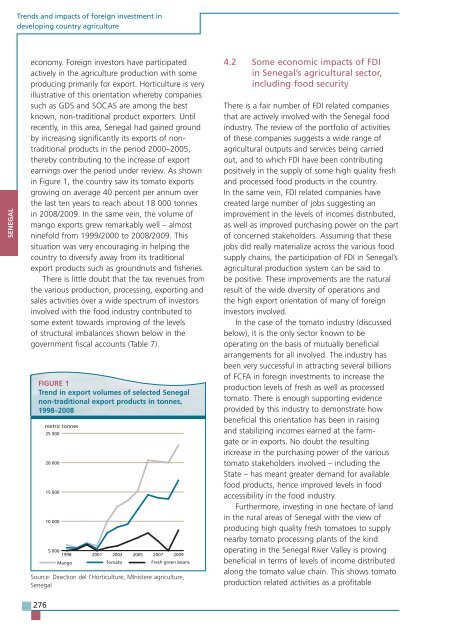TRENDS AND IMPACTS OF FOREIGN INVESTMENT IN DEVELOPING COUNTRY AGRICULTURE
TRENDS AND IMPACTS OF FOREIGN INVESTMENT IN DEVELOPING COUNTRY AGRICULTURE
TRENDS AND IMPACTS OF FOREIGN INVESTMENT IN DEVELOPING COUNTRY AGRICULTURE
Create successful ePaper yourself
Turn your PDF publications into a flip-book with our unique Google optimized e-Paper software.
SENEGAL<br />
Trends and impacts of foreign investment in<br />
developing country agriculture<br />
economy. Foreign investors have participated<br />
actively in the agriculture production with some<br />
producing primarily for export. Horticulture is very<br />
illustrative of this orientation whereby companies<br />
such as GDS and SOCAS are among the best<br />
known, non-traditional product exporters. Until<br />
recently, in this area, Senegal had gained ground<br />
by increasing significantly its exports of nontraditional<br />
products in the period 2000–2005,<br />
thereby contributing to the increase of export<br />
earnings over the period under review. As shown<br />
in Figure 1, the country saw its tomato exports<br />
growing on average 40 percent per annum over<br />
the last ten years to reach about 18 000 tonnes<br />
in 2008/2009. In the same vein, the volume of<br />
mango exports grew remarkably well – almost<br />
ninefold from 1999/2000 to 2008/2009. This<br />
situation was very encouraging in helping the<br />
country to diversify away from its traditional<br />
export products such as groundnuts and fisheries.<br />
There is little doubt that the tax revenues from<br />
the various production, processing, exporting and<br />
sales activities over a wide spectrum of investors<br />
involved with the food industry contributed to<br />
some extent towards improving of the levels<br />
of structural imbalances shown below in the<br />
government fiscal accounts (Table 7).<br />
FIGURE 1<br />
Trend in export volumes of selected Senegal<br />
non-traditional export products in tonnes,<br />
1998–2008<br />
276<br />
metric tonnes<br />
25 000<br />
20 000<br />
15 000<br />
10 000<br />
5 000<br />
1998<br />
2001<br />
2003<br />
2005<br />
2007<br />
2009<br />
Mango Tomato Fresh green beans<br />
Source: Direction del l’Horticulture, MInistere agriculture,<br />
Senegal<br />
4.2 Some economic impacts of FDI<br />
in Senegal’s agricultural sector,<br />
including food security<br />
There is a fair number of FDI related companies<br />
that are actively involved with the Senegal food<br />
industry. The review of the portfolio of activities<br />
of these companies suggests a wide range of<br />
agricultural outputs and services being carried<br />
out, and to which FDI have been contributing<br />
positively in the supply of some high quality fresh<br />
and processed food products in the country.<br />
In the same vein, FDI related companies have<br />
created large number of jobs suggesting an<br />
improvement in the levels of incomes distributed,<br />
as well as improved purchasing power on the part<br />
of concerned stakeholders. Assuming that these<br />
jobs did really materialize across the various food<br />
supply chains, the participation of FDI in Senegal’s<br />
agricultural production system can be said to<br />
be positive. These improvements are the natural<br />
result of the wide diversity of operations and<br />
the high export orientation of many of foreign<br />
investors involved.<br />
In the case of the tomato industry (discussed<br />
below), it is the only sector known to be<br />
operating on the basis of mutually beneficial<br />
arrangements for all involved. The industry has<br />
been very successful in attracting several billions<br />
of FCFA in foreign investments to increase the<br />
production levels of fresh as well as processed<br />
tomato. There is enough supporting evidence<br />
provided by this industry to demonstrate how<br />
beneficial this orientation has been in raising<br />
and stabilizing incomes earned at the farmgate<br />
or in exports. No doubt the resulting<br />
increase in the purchasing power of the various<br />
tomato stakeholders involved – including the<br />
State – has meant greater demand for available<br />
food products, hence improved levels in food<br />
accessibility in the food industry.<br />
Furthermore, investing in one hectare of land<br />
in the rural areas of Senegal with the view of<br />
producing high quality fresh tomatoes to supply<br />
nearby tomato processing plants of the kind<br />
operating in the Senegal River Valley is proving<br />
beneficial in terms of levels of income distributed<br />
along the tomato value chain. This shows tomato<br />
production related activities as a profitable


